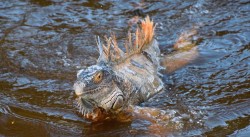News
RCIPS & DOE Remind Iguana Cullers of Responsibilities

The Royal Cayman Islands Police Service and Department of Environment are issuing a reminder to registered iguana cullers and members of the public regarding the requirements and responsibilities of iguana cullers participating in the DOE’s ongoing Green Iguana Cull.
Firstly, all iguana cullers who are using firearms (air rifles) for the purposes of the cull are required to place signs prominently in the area where they will be discharging the firearm. These signs are to indicate that they are conducting a cull in that area. Cullers using air rifles must also wear a high-visibility vest identifying them as an iguana culler. Most importantly, any culler using an air rifle must have a valid firearms license issued by the RCIPS. Simply having a culling license does not automatically entitle you to use an air rifle.
All iguana cullers must secure permission from property owners before entering onto any private property to conduct a cull, whether or not they are using an air rifle.
The RCIPS and DOE are also encouraging members of the public to contact the RCIPS if they witness any culler who is in breach of these requirements.
“We have had recent reports of cullers trespassing on private property or firing air rifles without displaying the proper signage,” said Inspector Courtney Myles, head of the RCIPS Community Policing Department. “We want members of the public to know that we take any reports of trespass or firing air rifles illegally very seriously. For the cullers, just remember that having a license does not exempt you from following the law. Any such offenses will be investigated and dealt with accordingly.”
The DoE acknowledged that, partly due to the success of the cull, cullers may be facing increased difficulty in maintaining their numbers, but stressed that their requirements remain unchanged.
“We sympathize with the fact that things are tougher now with the reduced number of greens in the wild and that people may be tempted to take shortcuts,” said Fred Burton, manager of the DOE’s Terrestrial Resources Unit, who oversees the Green Iguana Cull. “However there is no excuse for failure to follow the guidelines put in place for registered cullers. Such failures will not be tolerated and, if caught, your culling license will be revoked.”
The DOE is also reminding cullers to be mindful of receiving iguanas from third parties.
“You are responsible for the conduct of anyone who provides you with iguanas that you submit for the Green Iguana Cull,” said Mr. Burton. “If they are found to be breaching the requirements in culling iguanas, you may be the one who ends up penalized.”
“We have seen great success with the Green Iguana Cull, which is now in its eleventh month, and we look forward to working with the public and our cullers to ensure that the same standards are upheld going forward, for the continued success of the program and, most importantly, the safety of the public,” Mr. Burton added.












